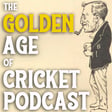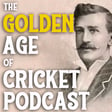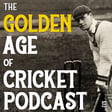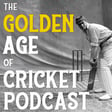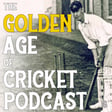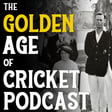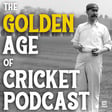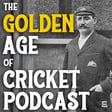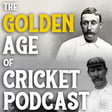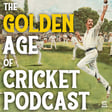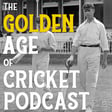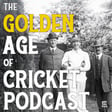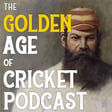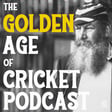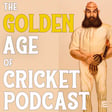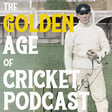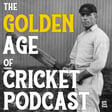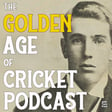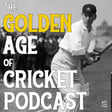Introduction to Gilbert Jessup Discussion
00:00:09
Speaker
Hi and welcome to the third and final part of my discussion on Gilbert Jessup's legendary Test match innings from 1902, featuring author Simon Wilde. We resume our chat as Jessup sensationally reaches his century.
00:00:27
Speaker
He eventually scores his century with a late cut off Armstrong, the bowling of Warwick Armstrong.
Reactions to Jessup's Century
00:00:35
Speaker
um Do we have any ah reporting of how the crowd, or indeed Jessup, reacted when he brought up his 100?
00:00:43
Speaker
Well, it's a good question how Jessup reacted. We don't actually know what he did, particularly, um but we do know I'm pretty sure he didn't sort of, you know, throw both arms up in the air and sort of run around and kiss kiss the ah kiss his cap and all that stuff.
Historical Crowd Celebrations
00:01:02
Speaker
I'm pretty sure that didn't happen. But the crowd... um did celebrate, and again, you know we we imagine, and I don't think it's completely wrong, is that people were far less, the public were far less demonstrative in those days than they would be now.
00:01:18
Speaker
But a lot of the reports, eyewitness reports, do describe how sort of crazy the crowd went. you know they were They were delirious with excitement, really. And um as you've read out the quote about the crowd you know waving their hands and handkerchiefs and hats and the rest of it. Well, but that happened again when he got to his 100 and the bowler hats were being thrown in the air and there was general mayhem, really. um And what the accounts do describe is how...
00:01:48
Speaker
the celebration was so sort of widespread that the game actually stopped. Well, now, again, when a player gets to 100, we're sort of quite used to the idea that the game stops for a couple of minutes whilst they celebrate. But I think in those days it was very unusual.
00:02:01
Speaker
But some of the reports say that the game stopped for several minutes. so you know Some of them said you know a couple of minutes, some said several. There was clearly quite a delay. and before the game could resume. So that gives us a good idea that there was it was mayhem, really, in
Jessup's Innings and Scoring Context
00:02:18
Speaker
the crowd. you know There was so such excitement, as there would be later when England win the game.
00:02:24
Speaker
So I think the behaviour of the crowd on that day was... a bit of a, I would say, maybe it hadn't been seen before at a at an English ground.
00:02:34
Speaker
I think, ah certainly English test match. i call ah I can't think of an occasion when it might have happened. I suppose when Australia beat England for the first time in 1882 at Global, that would have been ah a shocking event. But given that England lost, I think there would have been a stunned silence rather than delirious cheering. And there would have been many Australians in the ground.
00:02:55
Speaker
So I think this was probably new territory in terms of crowd behaviour in England. I think a lot of people commented on the celebrations and I think that's because it was unusual.
00:03:07
Speaker
Yeah, and we we also have to think, ah you know, he scored his century, which is a remarkable individual feat. But at this point, ah the crowd's also cheering because they're still in the game, which when he walked to the crease seemed very unlikely.
Timing and Pace Analysis of Jessup's Innings
00:03:23
Speaker
So there's still this hope that England will actually snatch victory.
00:03:27
Speaker
um Jessup is finally dismissed shortly after for 104. And there's nice symmetry there with Tromper's innings from the previous test, which he scored before the lunch interval. He also scored 104.
00:03:41
Speaker
What's remarkable about Jessup's 104 is that it came off a total team total of 139 runs. so his share was ah Just remarkable.
00:03:53
Speaker
And in that share, Jackson scored 18. ah So going back to what we were discussing before, how Jackson assumed this more defensive conservative style, ah George Hurst contributed nine and the extras scored eight.
00:04:09
Speaker
um So he's out for 104. ah Now comes the actual analysis of how fast he scored it. The official time given was, or the long held theory is that he scored it in just 75 minutes so an hour 15 that's the time which has long been associated with this innings you did your own analysis what did you find I thought, um yes, i was in them it's an interesting subject, this, because i mean who you know who was keeping who was keeping a record at the time and how were they keeping it?
00:04:47
Speaker
um that There was a pavilion clock at at the Oval on the roof, which the player is still there now. I mean, ah the clock might have changed, but it's in the same position and it looks the same to me.
00:04:58
Speaker
um But the players and the umpires could see it and it would have been the clock used by the umpires to decide when to start and stop play, etc. But you couldn't see that from the press box because that was underneath.
00:05:10
Speaker
The scorers couldn't see it. So who was keeping an official time and and and how was it being done? Obviously, so timepieces then were far more erratic than they are today.
00:05:21
Speaker
My reading of it is, having read all the newspaper reports, the the estimations of the time of various things to do with this match, not just Jessup's innings, but other innings and team innings,
00:05:36
Speaker
is that they vary quite a lot, you know more than five minutes each way. um So I don't ah don't think we can necessarily trust them. And I think also there was a sense that, I mentioned this in the book, how at that period there was a bit of an obsession with speed and men driving cars faster, trains going faster. We'd had the first 100-mile-an-hour car around this time. Trains were going at more than a mile a minute, so obviously 60 miles an hour.
00:06:06
Speaker
um sprinters were breaking records for time there was a there was quite a sort of thing about how men were getting faster at doing things you know athletic feats were being done faster and I think there was a I think there was a ah bias towards yeah saying it Jessup got there faster than they did and also so they always rounded it up to five minutes or rounded it down to five minutes rather so Even if they'd known he was batting 78 minutes, they'd say 75.
00:06:36
Speaker
Very few of the counts, but some of them do, given a timing that's not rounded up to or down to five minutes. So I've gone through, forensically gone through all the timings. And also the other thing, the the clue, I suppose, the best clue is that the overrates were so fast in those days, they would get through 20 overs an hour.
00:06:57
Speaker
And there were no delays for, you know, DRS reviews or drinks breaks or... Well, in fact, yeah, there there were there were no interruptions really in play unless you lost the ball perhaps in the crowd or somebody who was injured. So James Kelly, the Australian wicketkeeper, was hit by a bale.
00:07:12
Speaker
Somebody with Tom Hayward, think, was bowled and the bale flew up and hit Kelly in the face and he was quite badly hurt. um And so there a bit of a delay whilst he got some treatment. But otherwise, play did not stop for anything.
00:07:25
Speaker
They just kept playing. so And they kept on the way to 20 overs now. So... On that basis, we're working to three minutes per over throughout the match. um And i can tell from the ah the first and second days that that's pretty much what they kept to. Sometimes when a lot of wickets fell in a session, it might be slightly slower, obvious reasons.
00:07:48
Speaker
But you can work to three minutes per over pretty rigorously. And, and okay, if Jessup had an over where he'd taken you know four fours off the over, maybe assume it's going to taken a little bit longer than that.
00:08:01
Speaker
But just working on that rough rule of thumb, I was able to... break down the innings and it fitted pretty well with anecdotal evidence about what time they'd they'd taken.
00:08:14
Speaker
The other point is the other factor to bear in mind in terms of how long he batted was in terms of his overall innings. As we discussed, when he got to 100, the game stopped for a few minutes.
00:08:24
Speaker
Yet a lot of the accounts say he batted 75 minutes to get to 100 and only 77 minutes for his whole innings. He faced four more balls after... getting to a century before he was out. And there's the delay for the celebration of the 100, and yet some of the accounts were only adding two minutes on. Well, clearly, they're not counting the stoppage for the celebration for the 100. So there's a lot of you know inaccuracies in there that you can quite easily pick up
Reconstructing Jessup's Century
00:08:51
Speaker
on. um Anyway, to cut a long story short, ive I concluded that he actually took 80 minutes to get to his 100, and then he batted, but so that's five minutes more than generally accepted.
00:09:01
Speaker
And 85 minutes for the whole innings, I've added, you know, so another four balls and a bit of a celebration, three minutes maybe for the celebration, 85 minutes in all. So, yes, that was another detective ah job really to try and work out the time.
00:09:18
Speaker
yeah um But ah it's some that was an interesting process. Yeah, and we've we've spoken about it already, but ah the other analysis, of course, through modern eyes, you know we want to be able to compare it to modern cricket. So the other analysis is how many balls faced as part of Jessup's innings. so ah you argue in your book that he faced between 72 and 74 balls for his century.
00:09:46
Speaker
um What's interesting is um because that's fantastic, fewer than the generally accepted view, that would actually um move him up the order of the on the list of the overall ah fastest test sentry by an English batsman.
00:10:04
Speaker
ah It moves him up four places ah to number 11 overall.
Detailed Account from Newspaper Archives
00:10:08
Speaker
So could you just, um again, quickly take us through how you worked this out? Okay, so um the the Gerald Broder book of 1974 included a cutting from the Jessup family scrapbooks.
00:10:23
Speaker
it We didn't know what paper it was. With the help of the Jessup family, we worked out that it came from the Athletic News, which is a respected weekly sports paper, came out five days after the match.
00:10:34
Speaker
That listed... every ball that Jessup faced, and it said that it suggested that Jessup took 76 balls to get to his 100. That was the only known source for the 76-ball claim that has been accepted ever since Broderub's book, really.
00:10:50
Speaker
Bill Frindle, when he ran Wisden's records, he put it into the... Once in the 1980s, we had Ian Botham getting two quick hundreds in the 81 Ashes series. Then we got Viv Richards getting 100 56 balls.
00:11:01
Speaker
ah fifty six balls against England in Antigua in 1986. Suddenly there was a lot of interest in what the fastest test hundreds were and people started scouting around for earlier cases.
00:11:14
Speaker
Gerald Broderick himself wrote an article in the Wisden Almanac about fast hundreds and reminded everyone the Jessup 100 took 76 balls. He was basing that on the cutting he'd used.
00:11:26
Speaker
There was no other evidence though and nobody, the i mean the part of the reason I did the book was because nobody had ever really gone into the Jessup innings properly and given it ah you know for a thorough examination.
00:11:38
Speaker
um That's why i did it. um In the course of my researches, I have been greatly helped by the British Newspaper Archive, which is now digitised. So basically, you can sit at home at your desk rather than going to a newspaper library and thumbing through newspapers yourself.
00:11:53
Speaker
you can And it's searchable, so you can put in Gilbert Jessup you know for the the day after the game and you'll come up with many newspaper reports. So It's a lot easier than it was, um though still complicated.
00:12:05
Speaker
um And I ended up finding all sorts of newspapers that i would ah they had good accounts of the match that i would never have... thought of looking at, you know. um And I basically I discovered a newspaper called The Morning Leader that was a London morning paper.
00:12:21
Speaker
ah it got merged with the Daily News that was a better known newspaper in England, liberal paper set up by Charles Dickens in the 1800s. um So The Morning Leader sort of isn't remembered now at all as ah as a newspaper worth looking at, but actually it was very good at sports coverage.
00:12:38
Speaker
And amazingly, on the day after the game, it had a ball-by-ball list of Jessup's innings. And not only did they have a list of the balls faced, it also told you who was bowling at the time.
00:12:49
Speaker
And furthermore, if he Jessup didn't score off the ball, it would tell you whether he played a shot at it or whether he left it. So whether he'd... hit you know he'd hit it and the field had stopped it or whether he'd just let it go.
00:13:03
Speaker
So this is amazing that was an amazing sophisticated detail for the time. It's the sort of thing that would happen in a... Bill Frindle would have done it and all the scores, and you know ah modern scores now would keep a note of that sort of stuff. But back then it was completely new and I've not really read or found other cases of people doing something similar.
00:13:24
Speaker
um in fact, Charles Davis, who runs ah um a stats website in Australia, some of your listeners may know of, um he's done a lot of work in early scorebooks.
00:13:35
Speaker
He's done a lot of research into early scorebooks and he found somebody in um Australia who was keeping ah similar sorts of notes around that time, actually a little bit later than 1902.
Jessup's Career and Legacy
00:13:47
Speaker
But it was it was groundbreaking stuff. And so i was very surprised when I found this cutting, but obviously it was a like a eureka moment because I thought, hang on, this is... this is um This is amazing.
00:13:58
Speaker
And I quickly realized that it was coming up with a different answer from the Athletic News um cutting. So basically, we had two, basically in a nutshell, we have two ball-by-ball lists for the Jessup innings now rather than one.
00:14:12
Speaker
And as I think I said earlier, by marrying those two up and also... going through the newspaper accounts carefully, I've managed to reconstruct the all the overs that took place whilst Jessup was at the crease.
00:14:26
Speaker
the other thing The other little detail is that because Jessup was batting ah between 1 o'clock, 10 past 1 and about 3.15 when he got out, that was sort of the time that the London...
00:14:37
Speaker
evening newspapers were going to press and also the English regional evening papers were going to press. So basically lots of journalists in the press box were writing reports for their evening papers ah but as the map as the innings was unfolding. And so they put in a lot of detail about the shots that Jess had played and what was happening in the game. So it it was like a sort of running commentary and there were lots of them of what was happening. So that helped me reconstruct the innings because there was a lot of people telling telling us about pretty much every over of the inning so that they helped but the morning leader list was the crucial thing because it it gave you who was bowling and it gave you a sort of sequential list but the the morning leader list and the athletic news list are very similar they're not that different which is reassuring so it suggests that actually
00:15:28
Speaker
but You can trust them both. And yeah anyone who suggests that the Chessops innings is not the fastest 100 for England is ridiculous because they the the the evidence of all this evidence to some being in anything between 71 balls and 76, if you like, you know, um it's in that range. no and Nothing suggests that it's lower than that. So ah that's reassuring, really. You know, I could have discovered that, in fact, he scored his under 85 balls or something. You it could be something completely different and not very encouraging for Jessup's point of view in terms of the record.
Cricket Records and Era Style
00:16:04
Speaker
But contrary, I think it supports the idea that it was very fast and faster than anything else we've seen.
00:16:13
Speaker
father and your brother that' a on you So Simon, as is known, this match becomes known to history as Jessup's match. England win by one wicket.
00:16:27
Speaker
ah They lose the overall series 2-1, but it was looking like they weren't going to win at all at one stage. So Jessup obviously has his name etched in history forever. Just quickly, um before we sum everything up, He never really recreated his heroics, did he? Or he never did anything quite like that again. Can you describe just quickly, ah say the rest of his cricket career?
00:16:54
Speaker
Well, he carried on playing until the First World War broke out 1914. And that was the end. But he was 40 by that point. um but he was forty by that point um So had there even had there been no war, he wasn't going to play much longer, I don't suppose. um He continued to do some pretty amazing things in country cricket and remained a great entertainer. And, a you know, the crowds loved him.
00:17:17
Speaker
um it it was always fun watching him bat, even even if he didn't come off. Whilst he was at the crease, he'd he'd be he'd be worth he'd be worth watching. But he did have a lot of success still. But he didn't do much for England.
00:17:31
Speaker
He played the first test in 1905, got dropped. He was out first ball in the the first test. jess Jackson kind of lost faith in him and picked to other people. He got...
00:17:42
Speaker
He played in the 1909 Ashes series in England, got injured. That was the end of his summer. ah That was a back problem. Interestingly, actually, in that so that the series following 1902 was in Australia, 1903-04. Pelham Warner took a team to Australia.
00:17:58
Speaker
England won. was a famous series from English points but point of view, a famous win. Jessup didn't go. partly because Lord Northcliffe, who owned the Daily Mail um and was transforming the British newspaper market, wanted the star of the 1902 series to write columns about the 1903-4 tour from England using cables. And so he paid Jessup to stay at home and and write for him about the series. So that was one of the reasons why Jessup didn't go on the next Australia tour was because he was being paid to write write newspaper articles about it, which was, ah as we've discussed, acceptable income for an amateur cricketer.
00:18:43
Speaker
So that's why he didn't play then. But so yeah, he didn't play that much more test cricket. Obviously, there were fewer series in those days. He did play against South Africa in 1907, three test series, and he played a spectacular innings at Lourdes against an attack that included some of the South African googly bowlers that will become sort of very well known, the early pioneers of googly bowling.
00:19:08
Speaker
And he smashed 93 off 64 balls when he was out. When people say, what's the closest anyone's come to beating Jessup's record from 1902? The answer is Jessup himself. because in and that in he He could have got to a hundred in you know sixty ah something under 70 balls quite easily. 93 off 64.
00:19:29
Speaker
He could easily have got another seven runs off five and five or six more balls. So he would have taken the record down to something in the high 60s. But he didn't. ah But he is the nearest, in a way, to beating his own record.
00:19:42
Speaker
um So that was the probably the the only, that was the other great day he had. But obviously that was South Africa, not Australia, so it's maybe not as well remembered. But that was that was his other great day of test career.
00:19:56
Speaker
It is one of those oddities, peculiar things. You touched on it earlier. I mean, ah two of the great names of certainly English cricket in the golden age, C.B. Fry and Gilbert Jessup, tremendous batsmen, certainly at first class level.
00:20:14
Speaker
But when you look at their test records, collectively they both score...
Golden Age of Cricket Romanticism
00:20:19
Speaker
ah Well, collectively, they score three test sentries, even though i think Fry scored 94 first-class sentries and Jessup over 50. So there is this sort of asterisk, I suppose, against their name that they often didn't ah perform to their best in test cricket. But, um you know, again, that's up for debate. But it does does look odd when you look at the record books.
00:20:45
Speaker
So Simon, towards the end of your book, you have this beautiful phrase which I'm going to ah just quote here. And you note, quote, In no calendar year between 1922 and 1974 was the rate of scoring in Test cricket as fast as it was in 1902.
00:21:05
Speaker
Jessop was cherished as a symbol of a vanished era and a lost spirit of adventure. So do you think when you know the the phrase, the golden age of cricket, really comes into the public mind in the mid-20th century, thanks to writers like Neville Cardis and A.A. Thompson, do you do you think that they had Jessup in mind when they were using that phrase?
00:21:31
Speaker
Oh, yeah, I should think so. Jessup and, um and well, and and Trumper, people like that. um There was a there was a spirit of adventure, I suppose, about the way they played, um ah free a sort of slightly freewheeling approach that,
00:21:47
Speaker
was lost later. So, as I mean, the you know, these people are writing about an earlier age, but they're thinking about their own age and the cricket in the 20s, 30s, 40s, 50s. I mean, the 50s was pretty attritional stuff.
00:22:03
Speaker
um The golden age was was was a vanished age by that point. It was it was hard to imagine you know how it had ever happened because it was so different from the cricket that was being played by the fifty s I mean, um Cardis wrote an essay in the 50s about Jessup and at the time he was writing, the scoring rate in test cricket was like two runs and over. you know it was It's unimaginably slow now. Mm-hmm.
00:22:32
Speaker
So, yeah, he was talking about a vanished age and um and and and with with longing, really, and you know some regret that it wasn't still around. So, yeah, it's it's partly a reflection of the time he was living in when he wrote it.
00:22:45
Speaker
um And there was a lot of that going on, A.A. Thompson, similar sort of thing, really. But, yeah, cricket became far more attritional.
Amateur to Professional Cricket Evolution
00:22:52
Speaker
was being the amateur, the old amateur players died out, really. They...
00:22:57
Speaker
They couldn't afford to play. They weren't they wanted to be paid um you know by 1963 in England. The distinction between amateurs and professionals had been scrapped, but it'd been scrapped because there were no amateurs, you know, um as simple as that, really.
00:23:13
Speaker
And people were playing for the places and and they had a living to make and they weren't going to chuck their wicket away trying to slog sweep anyone anywhere, really.
Possibility of Breaking Jessup's Record
00:23:22
Speaker
um it was ah It was a different mindset.
00:23:25
Speaker
And cricket only really... ah regained its spirit of adventure with one day cricket in the 60s i mean against indians of the 60s were pretty you know gary sabers people like that were were were great entertainers but really it was one day cricket that revived everything and brought back well it brought back the stroke play into the game really yeah and i'm reminded of that i think it was richie benno who said that gilbert jessop was the greatest one day player to have never played the game
00:24:02
Speaker
If you'd like to support the Golden Age of Cricket podcast, you can do so with a tiny financial donation, as much as a cup of coffee. Visit buymeacoffee.com slash goldenageofcricket.
00:24:22
Speaker
So one final question for you, Simon, and um it's in relation Baz Ball, the age we now live in, and we are recording this podcast in the wake of a fabulous ah test series between yeah England and India, 2025 the English summer.
00:24:39
Speaker
it seems like Jessop's record could be broken at any stage. We saw some very quick sentries made in this recent summer test series. And although records are made to be broken, is there a romantic side to you that hopes that this particular record is never broken?
00:25:00
Speaker
Well, I've lived through some anxious moments in the last 12 months writing this book because i I thought when I started that I would be writing a book about the Jessup innings but also about the innings that would break it. you know I'd said to, I think...
00:25:16
Speaker
Someone I was talking to at the outset of this project that, you know, let's let's keep sort of a section at the back of the book for, you know, Harry Brook Ben Duckett or whatever, and we'll describe his innings that that breaks the Jessup record.
00:25:29
Speaker
But although there were some near misses, it hasn't happened. And um yeah, i I mean, Jamie Smith got 100 off 80 balls in the Edgbaston test a few weeks ago. And at one point he was 84 off 61, at which point I was convinced he was going to do it.
00:25:46
Speaker
So it's been a sort of... but once you start um so Once you start thinking about this thing, it sort of takes over your life, really. You watch every innings in a different way because you think, well, he keeps going at this rate, he's going to break the record.
00:26:00
Speaker
So it's it's it's slightly a slightly mad way of living your life, really. But I do... expect the record to be broken by one of these guys. And I sort of feel like it'd be shame if they didn't, because given the adventurous way they play, feels like one of them should.
00:26:16
Speaker
But some I don't know. I was sort of thinking these guys can clearly, they've clearly got the capacity to absolutely destroy a bowler. and we saw Jeremy Smith taking sort of 20-odd runs off a Prasid Krishna over Edgbraston.
00:26:29
Speaker
And you think, well, what if they can do it once, why doesn't he just keep doing it? But they tend to go through, i think one of the reasons they've not done it is because they they go through little little sort of passages. They'll have a sort of mood of 15 minutes where they'll they'll go berserk, and then they actually think there might be a bowling change or something, whatever, but they just like have a pause, and then they'll,
00:26:51
Speaker
they'll just defend and over for no apparent reason, really. They'll just take a breather and then go again. and maybe it's because they don't want to get out and they're thinking, this is a test match. I need to take a slightly longer view.
00:27:02
Speaker
And so they'll go quiet for a little while. And I think maybe that's why they haven't done it because clearly they've got the shots to this smash this record, really. but I think it will.
00:27:13
Speaker
Possibly um higher stakes, you could argue as well. i mean, they probably, you know, the the competitiveness for being in that first, you know, the English 11, it must be probably greater than it was 120 ago. And,
00:27:25
Speaker
twenty years ago and But you never know. i mean, I agree with you. I think it's only a matter of time before it's broken. And if anyone's going to do it, it's the current crop of english of English cricketers. But we'll wait and see. But thank you very much for being a guest on today's podcast. It's been fascinating. I applaud you for your latest book. So it's called Chasing Jessop, The Mystery of England Cricket's Oldest Record.
Podcast Conclusion and Book Promotion
00:27:51
Speaker
And it's out now and I cannot recommend it enough, not only for the dissection of Jessup's famous innings, but also for, you know, a history of cricket at that time, the history of reporting, newspapers, you know, the invention of cable and also a lot about Jessup's life. So congratulations and thanks again for being my guest.
00:28:15
Speaker
Well, thank you so much, Tom. Nice to talk to you. That's all from me in today's episode. Don't forget to like or subscribe to the podcast so you never miss an episode. My name is Tom Ford and until next time, it's bye for now.

